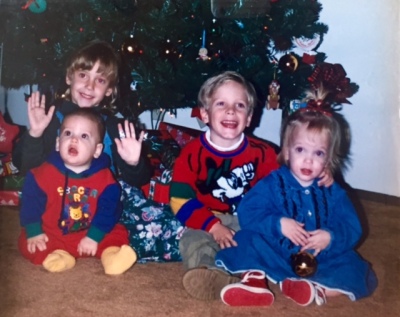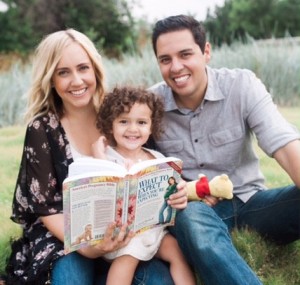On Choosing Abortion and Choosing Life
I’ve been on both sides of the abortion issue. Meaning, one time when I was pregnant I chose abortion and one time when I was pregnant, and advised to choose abortion, I chose life. This doesn’t make me more knowledgeable than others on the issue of abortion, it just makes me an expert on abortion as it affected my life.
Traveling backward in time thirty-four years ago, I was a was a High School senior who was struggling with poor self-esteem and had a hard time talking to boys. Words failed me (something that’s now hard to believe) and it was a relief to avoid conversation and “make-out” instead. I felt safe and I felt wanted when I was being held. Eventually, I ended up pregnant.
Scared as I was, I legitimately thought abortion was what my father would have wanted me to do. And I was more scared of disappointing him than anything else. I chose to have an abortion. Weeks later, my father found out what I had done and he told me frankly, “I think abortion is wrong.” I have often wondered what my life might look like if my father and I had had that conversation prior to me making that choice.
The reason the wondering attached itself to me is because there were so many years spent recovering from the hole that my abortion created. While my self-esteem may have been low prior to the pregnancy, after the abortion it plummeted. I have memories of cutting out images of little boys and taping them to my wall and naming them Christopher. I remember fastening the seatbelt in my car as if I had a passenger. Through the years, time and again, I did the math to determine the age of the never-born child. It was confusing.
I hadn’t shown love to my baby, and I was heartbroken.
Eventually, I married and my husband and I began to build a family. That didn’t stop the wound from oozing every now and again. During my second pregnancy with my husband, I learned I was having a boy. We already had a girl, so this was supposed to be good news, but I was struggling with the idea that I couldn’t love a boy-child. Somehow, I had concocted a fantasy that the aborted child was a boy. I was trying to remove the pain of what I had done to him and determined my love for my living child was only possible because she was a girl. I distanced myself from the child I had aborted with a belief that I wouldn’t have loved him as much as I loved my daughter.
God worked in my life in many ways to show me that despite making a bad decision, I was still loved. Perhaps the most significant way He worked came through my third pregnancy (in my marriage).
In April 1993, precisely ten years after I had chosen to abort my first child, I was lying on a doctor’s examination table being advised to have an abortion. The baby had a rare, sporadic brain malformation called, Dandy Walker Malformation. In layman’s terms, the baby was missing her cerebellum, which is the back portion of the brain. The cerebellum controls fine and gross motor skills. Without the cerebellum, there was no way to know if the child would walk, have the ability to use her hands, or even breathe without assistance. It is also the passageway for cerebral fluid as it exits the skull and, eventually, the body. Without that passageway, the child would develop hydrocephalus.
I do not tell this to villainize the doctor for what she suggested. Based on her values, her desire to see young couples have healthy babies, and what she understood about Dandy-Walker malformation and the risks associated with hydrocephalus, the doctor’s suggestion for abortion as an alternative was not meant to harm us. In her opinion, abortion was a viable option. If anything I have always been grateful that she suggested it, and here’s why.
It was no coincidence that I was in that place again. It was part of the plan of God, who knits together the most intricate stories to draw attention to His goodness. I was being allowed to choose again. Free will is at its finest when we choose the ways of God. In that moment that I chose life for my little girl, my heart was being healed in ways that I wouldn’t understand for another decade.
Some may be offended by this, but I have always been grateful that I had a choice. I am thankful that abortion was an option that I could deny. I am thankful that I chose life for her. My choice may have looked like a gift to her, but it was really a gift to me.
And as the late Paul Harvey would say, “And now for the rest of the story…”
 The baby girl was born and she wasn’t the monster that we had been warned about, not in any way. She had one surgery when she was five weeks old, and then her disability was almost non-evident. She was just one of our children. She crawled about the house wreaking havoc like any toddler and she had preferences in toys, books, and foods.
The baby girl was born and she wasn’t the monster that we had been warned about, not in any way. She had one surgery when she was five weeks old, and then her disability was almost non-evident. She was just one of our children. She crawled about the house wreaking havoc like any toddler and she had preferences in toys, books, and foods.
Then one January morning, my daughter, that I chose life for, passed away. In a breath of a moment, she was gone. Cerebral fluid had coagulated, forming a non-malignant cyst which settled on her brain stem while she was sleeping. Everything was fine, and then she was gone. She was nineteen months and five days old at the time.
I loved my daughter and I was heartbroken.
I am not going to compare the grief of losing a nineteen-month-old child to abortion, however, I do want to say that in both instances I have experienced disappointment and heartbreak. Because of that, I want to say this: there is a difference in suffering when it is accompanied by regret than when it is not.
Again, I am not an expert on the abortion issue, I just know how it affected my life. I have experienced regret for choosing abortion and lived with the effects of that for over half my life. Choosing abortion left a hole in my heart and the dagger that was tearing into me was regret.
I have also experienced satisfaction in being able to choose life, but I have felt the pain of the loss of that child for over twenty years. Choosing life for a child, who would die less than two years later, left a hole in my heart–but I have never experienced a day of regret for the choice that was made.



 Back then, my husband and I spent a lot of time on the floor. Playing with Barbies and “toy guys”, wrestling and reading, helping someone put on their shoes, or changing a diaper. We lived in a modest three bedroom home, and each of the kids’ rooms held one bed and one crib. The boy’s room was a primary colored den of Legos and Hot Wheels, while the girl’s room was a pastel princess palace with patchwork quilts and bunny rabbits.
Back then, my husband and I spent a lot of time on the floor. Playing with Barbies and “toy guys”, wrestling and reading, helping someone put on their shoes, or changing a diaper. We lived in a modest three bedroom home, and each of the kids’ rooms held one bed and one crib. The boy’s room was a primary colored den of Legos and Hot Wheels, while the girl’s room was a pastel princess palace with patchwork quilts and bunny rabbits. Diagnosed in-utero, Molly was greeted by a family ready to love her, which was only about the easiest task any of us ever had to face. She was agreeable, charming, and stunningly beautiful. She would eat whatever she was offered, play easily with her siblings or alone, and she had a smile that would stop strangers. Despite the lack of a cerebellum, her gross and fine motor skills developed with only a slight delay.
Diagnosed in-utero, Molly was greeted by a family ready to love her, which was only about the easiest task any of us ever had to face. She was agreeable, charming, and stunningly beautiful. She would eat whatever she was offered, play easily with her siblings or alone, and she had a smile that would stop strangers. Despite the lack of a cerebellum, her gross and fine motor skills developed with only a slight delay.




